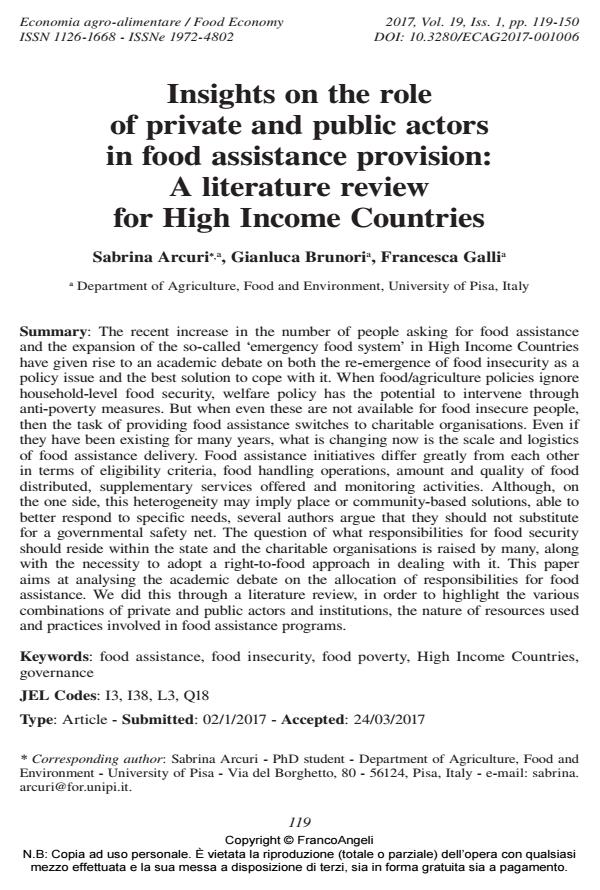Insights on the role of private and public actors in food assistance provision: A literature review for High Income Countries
Titolo Rivista ECONOMIA AGRO-ALIMENTARE
Autori/Curatori Sabrina Arcuri, Gianluca Brunori, Francesca Galli
Anno di pubblicazione 2017 Fascicolo 2017/1
Lingua Inglese Numero pagine 32 P. 119-150 Dimensione file 198 KB
DOI 10.3280/ECAG2017-001006
Il DOI è il codice a barre della proprietà intellettuale: per saperne di più
clicca qui
Qui sotto puoi vedere in anteprima la prima pagina di questo articolo.
Se questo articolo ti interessa, lo puoi acquistare (e scaricare in formato pdf) seguendo le facili indicazioni per acquistare il download credit. Acquista Download Credits per scaricare questo Articolo in formato PDF

FrancoAngeli è membro della Publishers International Linking Association, Inc (PILA), associazione indipendente e non profit per facilitare (attraverso i servizi tecnologici implementati da CrossRef.org) l’accesso degli studiosi ai contenuti digitali nelle pubblicazioni professionali e scientifiche.
The recent increase in the number of people asking for food assistance and the expansion of the so-called ‘emergency food system’ in High Income Countries have given rise to an academic debate on both the re-emergence of food insecurity as a policy issue and the best solution to cope with it. When food/agriculture policies ignore household-level food security, welfare policy has the potential to intervene through anti-poverty measures. But when even these are not available for food insecure people, then the task of providing food assistance switches to charitable organisations. Even if they have been existing for many years, what is changing now is the scale and logistics of food assistance delivery. Food assistance initiatives differ greatly from each other in terms of eligibility criteria, food handling operations, amount and quality of food distributed, supplementary services offered and monitoring activities. Although, on the one side, this heterogeneity may imply place or community-based solutions, able to better respond to specific needs, several authors argue that they should not substitute for a governmental safety net. The question of what responsibilities for food security should reside within the state and the charitable organisations is raised by many, along with the necessity to adopt a right-to-food approach in dealing with it. This paper aims at analysing the academic debate on the allocation of responsibilities for food assistance. We did this through a literature review, in order to highlight the various combinations of private and public actors and institutions, the nature of resources used and practices involved in food assistance programs.
Parole chiave:Food assistance, food insecurity, food poverty, High Income Countries, governance
- A multi-stakeholder attempt to address food waste: The case of Wellfood Action EU project Lorenzo Compagnucci, Alessio Cavicchi, Francesca Spigarelli, Lorenza Natali, in ECONOMIA AGRO-ALIMENTARE 3/2019 pp.503
DOI: 10.3280/ECAG2018-003012 - The Politics of European Food Aid Policy from Delors to von der Leyen Ilaria Madama, pp.11 (ISBN:978-3-031-90709-8)
- Addressing food poverty in systems: governance of food assistance in three European countries Francesca Galli, Aniek Hebinck, Brídín Carroll, in Food Security /2018 pp.1353
DOI: 10.1007/s12571-018-0850-z - Food waste reduction and food poverty alleviation: a system dynamics conceptual model Francesca Galli, Alessio Cavicchi, Gianluca Brunori, in Agriculture and Human Values /2019 pp.289
DOI: 10.1007/s10460-019-09919-0 - La transition à l’épreuve de la justice alimentaire : construction d’un répertoire de pratiques dans 5 initiatives à Angers, Lyon et Poitiers Camille Hochedez, Emilie Lanciano, Julien Noel, Séverine Saleilles, in Géocarrefour /2022
DOI: 10.4000/geocarrefour.21236 - Economic effects of food supply chain re-localization on the Croatian economy Davor Mikulić, Željko Lovrinčević, Damira Keček, in Agricultural and Food Economics 36/2023
DOI: 10.1186/s40100-023-00281-8 - Exploring power dynamics in a food bank in Bolivia. A case study during the Covid-19 pandemic Galindo Darío, Gruberg Helga, Dessein Joost, in Food Ethics 23/2024
DOI: 10.1007/s41055-024-00157-7 - Exploring the contribution of alternative food networks to food security. A comparative analysis Pedro Cerrada-Serra, Ana Moragues-Faus, Tjitske Anna Zwart, Barbora Adlerova, Dionisio Ortiz-Miranda, Tessa Avermaete, in Food Security /2018 pp.1371
DOI: 10.1007/s12571-018-0860-x - The Politics of European Food Aid Policy from Delors to von der Leyen Ilaria Madama, pp.165 (ISBN:978-3-031-90709-8)
- Child food insecurity in the UK: a rapid review Magaly Aceves-Martins, Moira Cruickshank, Cynthia Fraser, Miriam Brazzelli, in Public Health Research /2018 pp.1
DOI: 10.3310/phr06130 - Reference Module in Food Science Francesca Galli, Stefano Grando, Paolo Prosperi, Gianluca Brunori, (ISBN:9780081005965)
- From charity to justice? A comparative analysis of conventional food aid and agroecology-oriented food redistribution initiatives Francesco Facchini, Daniel López-García, Sergio Villamayor-Tomas, Esteve Corbera, in Local Environment /2026 pp.1
DOI: 10.1080/13549839.2026.2615009
Sabrina Arcuri, Gianluca Brunori, Francesca Galli, Insights on the role of private and public actors in food assistance provision: A literature review for High Income Countries in "ECONOMIA AGRO-ALIMENTARE" 1/2017, pp 119-150, DOI: 10.3280/ECAG2017-001006